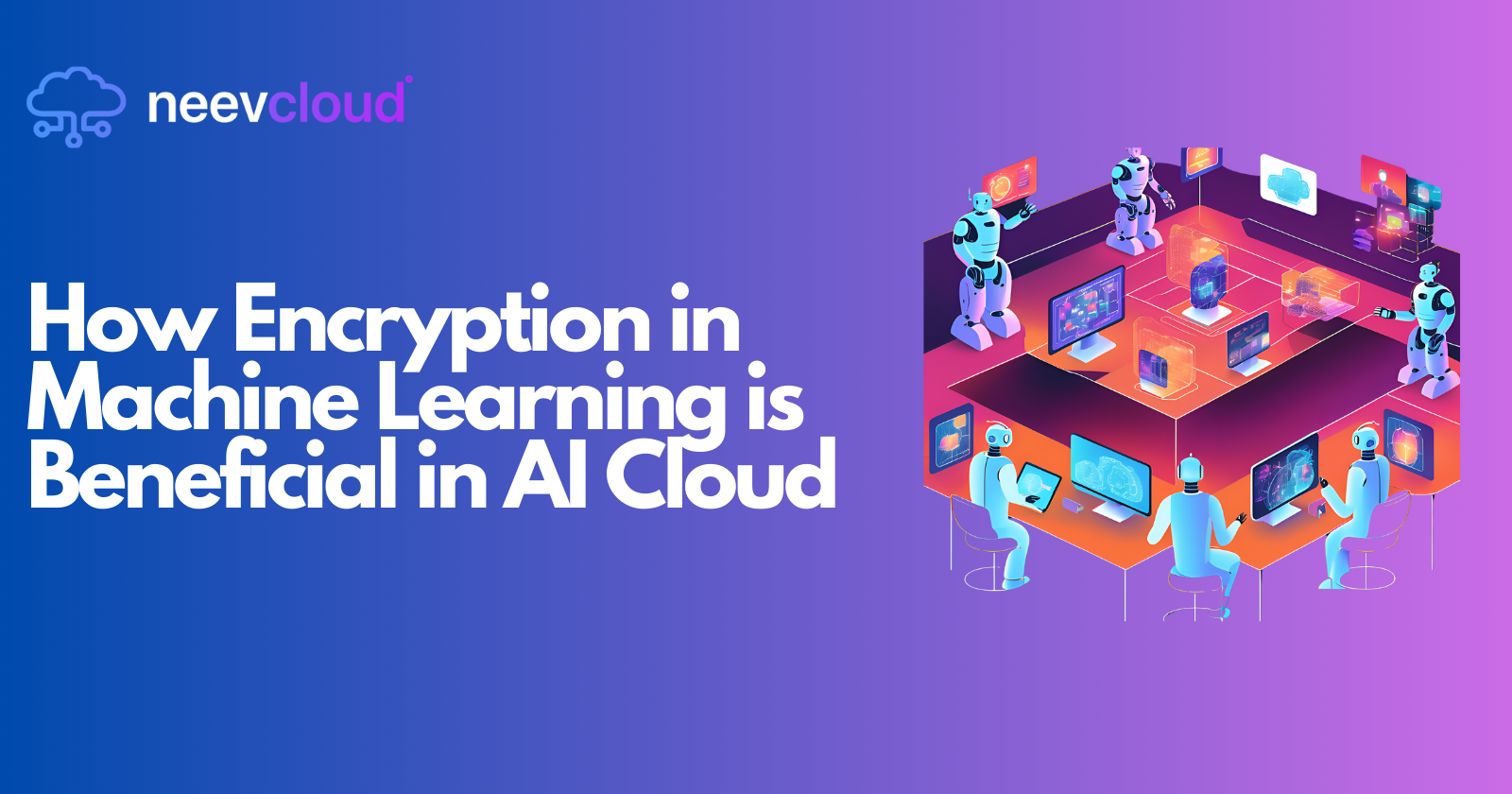How Encryption in Machine Learning is Beneficial in AI Cloud
 Tanvi Ausare
Tanvi Ausare
Machine Learning (ML) has become a cornerstone of AI-based solutions, offering insights and predictions that drive businesses forward. However, as these AI models are increasingly deployed in the cloud, concerns around privacy, data security, and intellectual property protection grow. Encryption has emerged as a critical solution, ensuring that sensitive data and models are protected throughout their lifecycle. In this post, we explore how encryption strengthens Machine Learning in AI Cloud environments, focusing on the benefits, challenges, and techniques.
1. Introduction to Encryption in Cloud Machine Learning
The adoption of cloud machine learning services has surged as companies seek to reduce infrastructure costs while gaining access to powerful tools for AI development. However, moving sensitive datasets and models to the cloud brings new risks, including:
Data breaches and unauthorized access
Model theft or inversion attacks
Compliance issues related to privacy laws such as GDPR or CCPA
To address these challenges, encryption ensures that the data and ML models are secure at every stage—whether they are in transit, at rest, or being processed. Encryption techniques also protect intellectual property by keeping proprietary models secure in the AI Cloud.
2. Key Encryption Techniques in AI Cloud
Encryption in AI-ML systems leverages several advanced cryptographic techniques. Below are the most prominent ones:
a. Homomorphic Encryption (HE)
Allows computations on encrypted data without decrypting it.
Ensures privacy by enabling cloud models to process sensitive information without exposing the raw data.
b. Secure Multi-Party Computation (MPC)
Distributes data among multiple parties, ensuring no single entity can access the full dataset.
Facilitates collaborative ML tasks without compromising data privacy.
c. Federated Learning with Encrypted Models
Keeps data localized on individual devices and only shares encrypted model updates.
Reduces the risk of data leakage during machine learning model training.
d. End-to-End Encryption (E2EE)
Ensures data is encrypted from the point of collection to its final storage location in the cloud.
Minimizes risks by encrypting both data-in-transit and data-at-rest in cloud machine learning environments.
3. Benefits of Encryption in AI-ML Workloads
Encryption offers multiple benefits to organizations utilizing AI Cloud solutions. Below are some of the most significant advantages:
a. Data Privacy and Compliance
Encrypted ML models help companies comply with data protection regulations such as GDPR, HIPAA, and CCPA.
Customer data stays private, even when processed in a cloud machine learning infrastructure.
b. Protection Against Model Inversion and Theft
Encrypted models prevent adversaries from reverse-engineering the model to extract sensitive data or proprietary information.
Safeguards AI-ML intellectual property in competitive markets.
c. Secure Collaboration in the Cloud
Encryption enables multiple organizations to collaborate securely by protecting both the input data and the final model outputs.
Facilitates multi-party machine learning without sharing raw data across stakeholders.
d. Reduced Risk of Data Breaches
Even in case of a cloud data breach, encrypted datasets and models remain inaccessible to unauthorized entities.
Strengthens the security posture of AI Cloud deployments.
e. Trust and Adoption of AI Solutions
Encryption builds trust among users and customers, encouraging them to adopt AI-ML technologies confidently.
Ensures businesses can scale their cloud machine learning operations securely.
4. Use Cases for Encrypted Machine Learning in Cloud
The use of encryption in AI Cloud environments opens up new possibilities across various industries. Let’s look at some key use cases:
a. Healthcare: Secure Medical Data Analysis
ML models analyze encrypted patient records without revealing sensitive information.
Helps healthcare providers comply with HIPAA while delivering AI-driven insights.
b. Finance: Encrypted Fraud Detection Models
Financial institutions use encrypted ML models to detect fraudulent transactions.
Enables collaboration between banks while protecting proprietary fraud detection algorithms.
c. Government: Privacy-Preserving Citizen Services
Governments leverage AI Cloud services to deliver personalized services to citizens while ensuring data privacy.
Encryption helps avoid data exposure in sensitive areas like taxation and social services.
d. Retail: Secure Customer Analytics
Retailers use encrypted machine learning models to analyze customer behavior and enhance user experiences.
Prevents unauthorized access to valuable business data in cloud machine learning environments.
5. Challenges in Implementing Encryption in AI Cloud
Despite the benefits, there are challenges to implementing encryption in AI-ML systems:
a. Performance Overhead
Encryption techniques like Homomorphic Encryption add computational overhead, slowing down ML training and inference.
Requires optimized algorithms and hardware acceleration for practical deployment.
b. Key Management Complexity
Effective encryption relies on secure key management practices.
In the AI Cloud, managing encryption keys across distributed systems can become complex.
c. Limited Compatibility with Existing Models
Some legacy machine learning models may need modifications to support encrypted data inputs.
Migration to encrypted models may require additional resources and planning.
d. Trade-off Between Security and Usability
Strong encryption enhances security but can complicate usability, especially in real-time AI Cloud applications.
Balancing security with performance and ease of use remains a challenge.
6. Conclusion
Encryption plays a pivotal role in securing AI-ML workloads in the cloud by protecting sensitive data, ensuring compliance, and preventing model theft. With advanced encryption techniques like Homomorphic Encryption and Federated Learning, businesses can confidently scale their cloud machine learning operations while preserving privacy and data integrity. However, challenges like performance overhead and key management must be addressed to unlock the full potential of encrypted ML systems.
As AI Cloud adoption grows, encryption will become a fundamental requirement rather than an option. By integrating encryption into their machine learning workflows, organizations can foster trust, enable secure collaborations, and unlock the true potential of AI-driven innovation in the cloud.
Stay ahead with NeevCloud
At NeevCloud, we understand the complexities of deploying AI-ML solutions securely in the cloud. Our team specializes in designing encrypted cloud machine learning systems that align with your business needs and compliance requirements. Contact us today to learn more about how encryption can protect your AI models and data while ensuring scalable and secure AI Cloud operations!
Subscribe to my newsletter
Read articles from Tanvi Ausare directly inside your inbox. Subscribe to the newsletter, and don't miss out.
Written by
